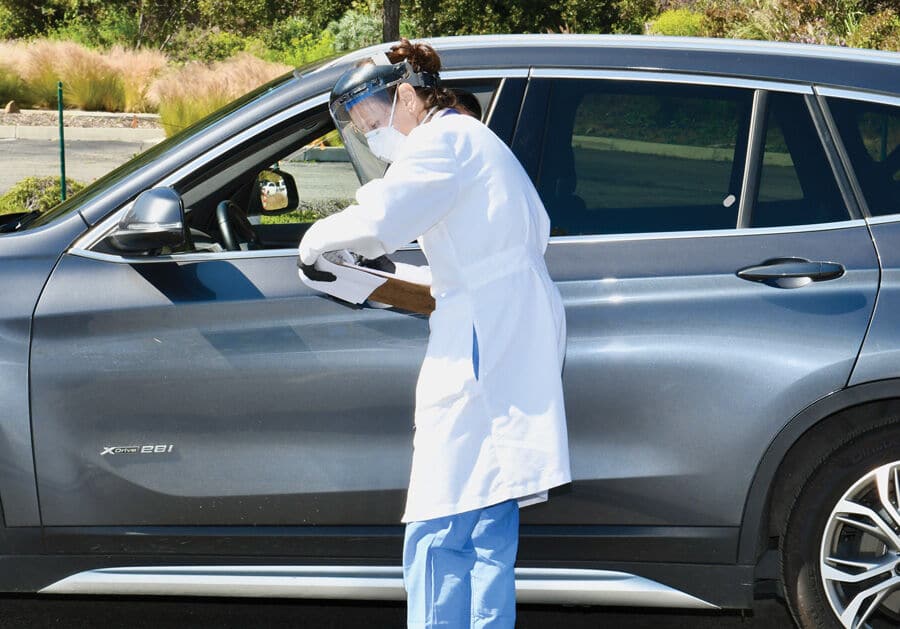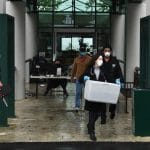
Lisa Benya, DO, has not had a day off since the coronavirus crisis hit in March. But the Malibu doctor is not complaining.
“I wouldn’t do well sitting on the sidelines,” Benya imagined. And she hasn’t. As soon as the pandemic hit, Benya was instrumental in setting up one of the first drive-thru testing sites in Los Angeles County here in Malibu. More than 5,000 people were tested in April and May at City Hall.
Benya has been working nonstop from day one. Although it’s been a blur of days and weeks, she said, “I’m really grateful that my training is allowing me to do this. I’m grateful to jump in and make a difference and try to help. This is why I got into medicine and why I’m so passionate about it. It’s what I’ve literally spent my life doing. I wouldn’t do well with a day off at this point.”
The internist and primary care doctor described how, just four months ago, things were so different.
“The minute we heard COVID-19 really was an issue we started to gear up to test, but our limitations initially were that the guidelines would not let us test many people at the beginning,” Benya described. “Clients had to pass all these criteria in order for the health department to be able to allow us to run a test. It was that strict.”
Benya speculated low testing was due to a limitation in supplies and tests.
“We didn’t know about asymptomatic spread at that time,” the doctor continued. “When we started in March, we really just looked for people that had the classic symptoms that we were told at the beginning—which was fever, cough, shortness of breath. We had very few supplies.”
She elaborated, “Things evolved quickly. Following the course of this disease we realized the contagiousness was so high. The mortality rate was high and there was a large amount of asymptomatic cases that were spreading. It became more vital to test as many people as possible.
“That’s when we jumped in, because we realized that when we looked at countries that were ahead of us in this fight—China, South Korea, Singapore—some of these countries seemed to get it right in that although they all had a large outbreak they were able to get that outbreak under control fairly quickly,” Benya continued. “What we found is that it was due to testing and tracing. They didn’t have limits in testing supplies so they were able to test people whether they had symptoms or not. When they got positives, they would isolate and they would trace like crazy and test everybody else. That’s the way to get a handle on it. Early on, we learned we had to test in mass quantity.”
But in March, Benya said, without supplies, manpower and the OK from the health department, the drive-through testing didn’t coalesce until she partnered with the City of Malibu, the nonprofit CORE (Community Organized Relief Effort) and other medical personnel.
“Malibu is an isolated island,” the physician of nearly two decades said. “Sean Penn, a founder of CORE, had access to PPE and testing. He was starting to do testing in other parts of Los Angeles and wanted to offer it to his hometown—Malibu.” They started with first responders then opened to the community at large—all complimentary.
In May, Benya said things were looking better: “Our positivity rate in Malibu was very low.” Today, alarming surges are reported county wide. She is still testing in her office and sees first responders in other areas free of charge.
The physician did say she was disheartened that a virus could cause such divisiveness. She encouraged everyone to follow the advice of top medical experts in what’s become the gold standard in stopping the spread.
“We will be OK sooner if we’re able to adhere to the things we know as fact and that is those safety protocols,” Benya suggested. “Keeping social distance, always wearing a mask in public, washing hands frequently or using hand sanitizer and try not to touch your face. If you can follow those guidelines, that’s the only way we know 100-percent we can slow or stop the spread and that gives us time to get a vaccine. There’s no shortcut.”

